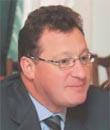
UKRAINE, VANCO ENERGY, AND THE RUSSIAN MOB
Publication: Eurasia Daily Monitor Volume: 5 Issue: 177
By:

The saga of Houston-based Vanco Energy Company’s conflict with the Ukrainian government over a shady production-sharing agreement (PSA) to explore the Black Sea shelf for oil and gas has taken a new twist.
Recently uncovered evidence suggests that one or more of Vanco Energy Company’s partners in Vanco Prykerchenska Company (VPC), a British Virgin Islands company formed in October 2007, which holds the rights to subsoil exploration on the Black Sea shelf, might be linked to Russian organized crime.
The four parity shareholder partners in VPC are Vanco International (Bermuda), a subsidiary of Vanco Energy Company; the Donbas Fuel and Energy Company (DTEK) owned by Ukrainian tycoon Renat Akhmetov; Integrum Technologies of Austria; and Shadowlight Investments, Ltd., owned by Russian businessman Evgeny Novitsky.
Integrum Technologies has refused to disclose its main investors, and Vanco executives have admitted on a number of occasions that they do not know the identities of the owners of Integrum. These admissions suggest that Vanco could not have conducted due diligence about Integrum before allowing them into the consortium. Evidence suggests, however, that Kyiv Investment Group, a company owned by Ukrainian oligarch Vasyl Khmelnytsky, is one of the hidden partners of Integrum.
Shadowlight Investments, however, has escaped media scrutiny until now. The company was described by Oil and Gas Eurasia (no. 6, June 2008) as an investment company owned by Russian businessman Evgeny Novitsky and that it was established specifically with the objective of funding the energy projects on the Black Sea shelf.
According to a number of reports in the press and the book Darkness at Dawn-The Rise of the Russian Criminal State by David Satter (Yale University Press, September 2004), Evgeny Novitsky is alleged to be a member of, or very close to, Russia’s Solntsevo organized crime gang.
Satter wrote that Solntsevo had close ties to a Russian company called Sistema, which is linked to Moscow Mayor Yuriy Luzhkov and to the IVK, the information technology company, of which Novitsky was director. Solntsevo, working through the company SV-Holdings, eventually came to own a large share of IVK.
Satter also claims that Novitsky was present at a restaurant in Prague in 1995 where Sergei Mikhailov (“Mikhas”), one of the reputed leaders of the Solntsevo mob, was present along with some 150 other people to celebrate the birthday of Viktor Averin, (“Avera”), also a reputed Solntsevo leader. Novitsky was allegedly held by the Czech police, who raided the party. He was fingerprinted and released.
Satter wrote that the French daily Le Monde had received confidential reports by the Russian Internal Ministry (MVD) and the Federal Security Service (FSB) that claimed that Novitsky, as President of Sistema, did not make any decisions without consulting the Solntsevo criminal brotherhood.
Kommersant wrote on July 22, 1997, that an unnamed official of the FBI had revealed the names of three individuals suspected of being “shadow bankers” for the Solntsevo mob, one of whom was Evgeny Novitsky.
The newspaper Russkiy Telegraf reported on October 16, 1997, that analysts from the Moscow office of the Department for Combating Organized Crime (RUOP) suspected Novitsky of laundering money for Solntsevo.
On August 24, 1999, the Moscow Times reported that Kirill Belyaninov, a journalist for Novaya Izvestia, had written an investigative article linking Novitsky and Semen Mogilevich to the Solntsevo group. Gennady Dalalayev, a spokesman for Sistema, refuted the charges and said that suggestions that Novitsky was tied to the Solntsevo gang were “rubbish.”
The Moscow Times noted that “Retired FBI agent Jim Moody, who was cited as a source in Belyaninov’s story, confirmed…that he had spoken with Novaya Izvestia. Moody said that Belyaninov’s article was ‘accurate’ in tying Mogilevich to the Solntsevo gang, but he could not confirm the allegations regarding Sistema.” Belyaninov, however, insisted that he had documentation, including material from Moscow’s Registration Chamber, to back up his allegations. Moody served as the FBI’s assistant deputy director for organized crime investigations from 1987 to 1996.
On August 1 Vanco Prykerchenska applied to the arbitral tribunal of the Chamber of Commerce of Stockholm to rule on the legitimacy of the Ukrainian government’s revocation in May of a production sharing agreement (PSA) signed on October 19, 2007, with the previous government of Victor Yanukovych.
A statement by the government of Ukraine issued on August 1 noted: “Vanco Prykerchenska Ltd. is not a subsidiary of the U.S. Company Vanco Energy. Vanco Energy is simply a minority shareholder in Vanco Prykerchenska Ltd., an Offshore company dominated by Ukrainian interests and other offshore entities whose ultimate owners remain undisclosed. It is Vanco Prykerchenska, and not Vanco Energy or its subsidiary Vanco International, which recently initiated arbitration against the GoU [Government of Ukraine] in Stockholm.”
The revocation of the PSA by Yulia Tymoshenko’s government in May was initially condemned by U.S. Ambassador to Ukraine William Taylor, but his position has since shifted to one of neutrality. U.S. Secretary of Commerce Carlos M. Gutierrez said in an address to the American Chamber of Commerce in Kyiv on June 5, 2008: “For the Government of Ukraine to attract investors, especially in those sectors vital to its energy security, it needs to make clear that it respects the sanctity of contracts and the rule of law” (https://kiev.usembassy.gov/main_eng_archive-2008.html).
Ukrainian President Viktor Yushchenko overturned the government’s decision in June. Prime Minister Tymoshenko, however, continued to insist that the Vanco contract was a “corrupt agreement concluded by the previous government” (“BYuT Inform Newsletter,” July 22).
If the allegations against Novitsky are proven to be true, Vanco Energy Company in Houston could possibly face charges under the Racketeer Influenced and Corrupt Organizations Act (RICO).
In the August 1 statement by the government of Ukraine, one paragraph appears to be a warning directed at Vanco management: “Given that Vanco Energy Company…is a U.S. corporation and subject to U.S. jurisdiction, the GoU has kept the U.S. government apprised of the situation as it has developed. The U.S. authorities are at the vanguard of the global fight against corruption, and the GoU will continue to work with all of its international partners to advance this investigation and pursue necessary legal steps as appropriate.”




